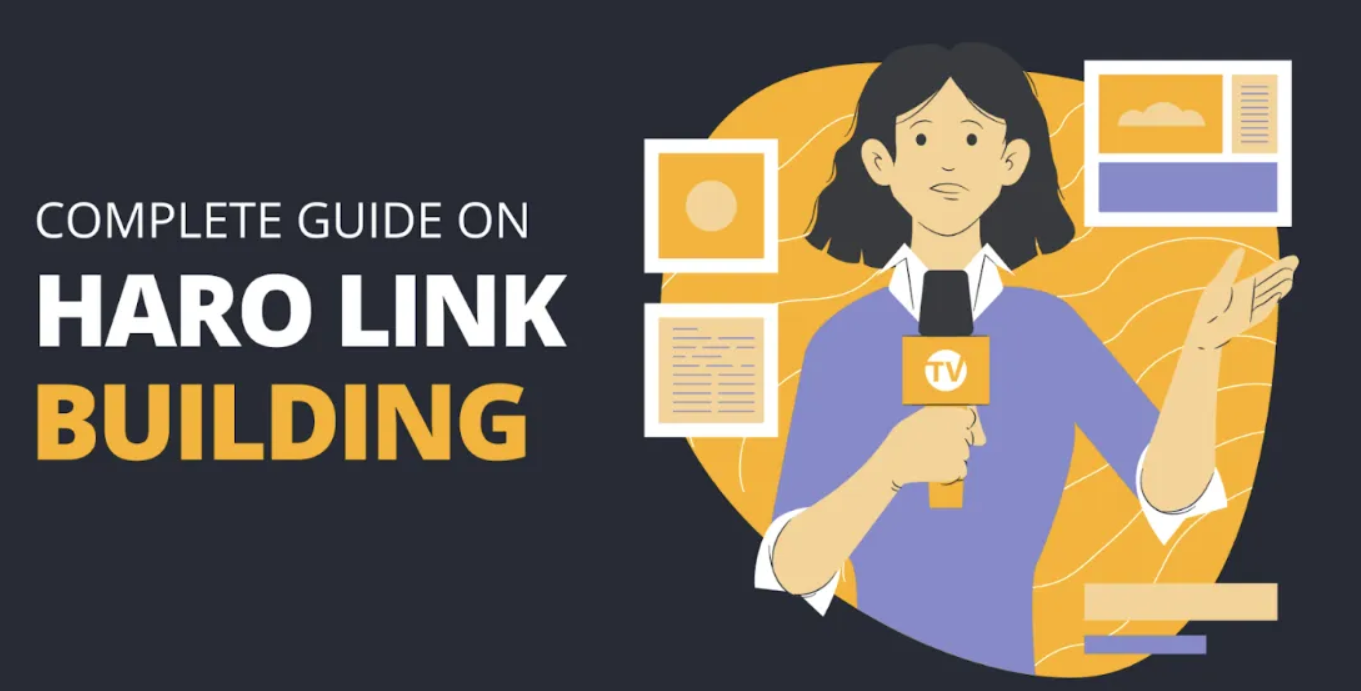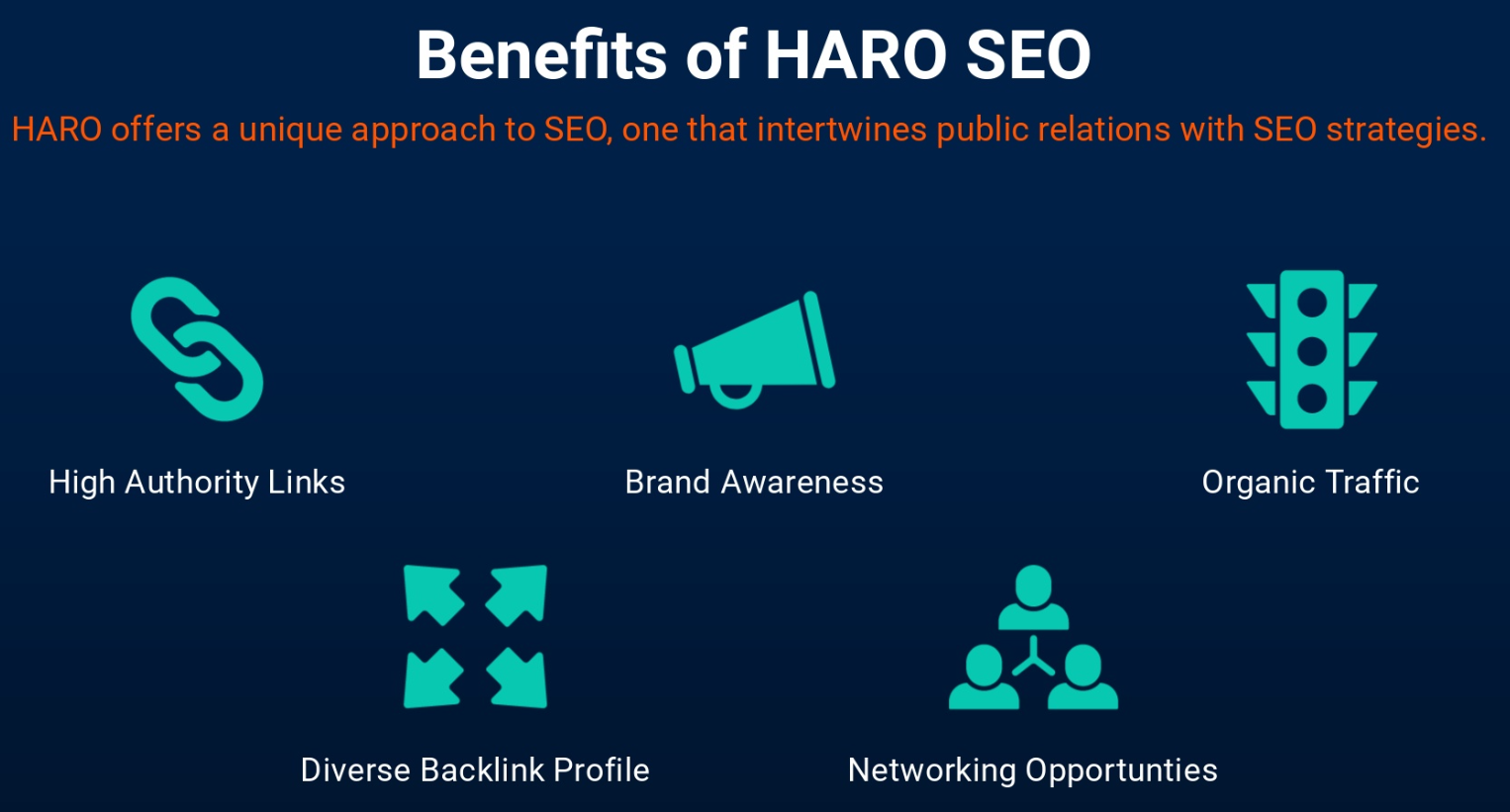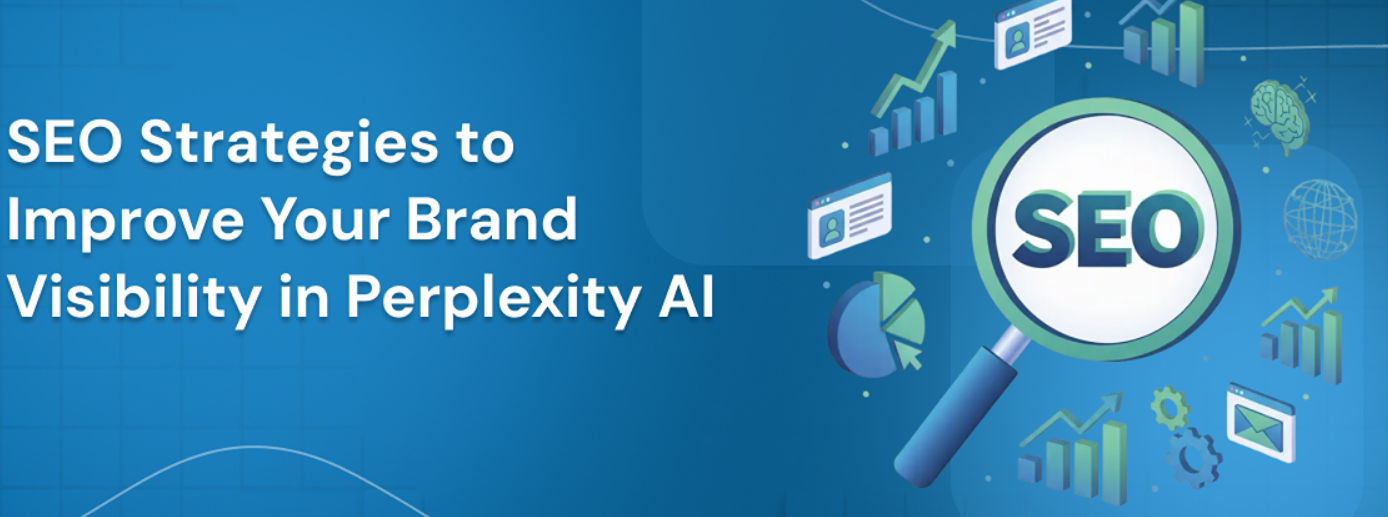Understand What HARO Link Building Is
HARO (Help A Reporter Out) connects expert sources with journalists who need insights for their articles. This powerful platform lets your expertise earn you valuable backlinks from respected publications. You need to understand HARO basics to pick the right agency that manages this process for you.How HARO works for backlinks
HARO matches journalists with industry experts. The system sends three daily email batches (at 5:35 am, 12:35 pm, and 5:35 pm ET) Monday through Friday. Each email lists journalist queries by category. Here’s the process:- Journalists submit queries asking for expert insights for upcoming articles
- Sources (that’s you or your agency) review these queries and respond to relevant ones
- Journalists select the best responses to include in their content
- Your published contribution usually has your name, company, and a backlink
Why journalists use HARO
Journalists work with tight deadlines and need expert sources to make their content more credible. HARO gives them quick access to industry specialists without long research or cold outreach. Journalists use HARO to find:- Expert commentary and quotes
- Ground examples
- Statistical support and data
- Industry viewpoints
Benefits of HARO for SEO
Quality backlinks are HARO’s main SEO benefit. A study of 1,500 journalist queries found 68% had a domain rating of 50 or higher, and 89% of published queries came from sites with DR 50+. You could earn links from highly authoritative domains. On top of that, more than half of all published articles used dofollow links, which pass SEO value to your website directly. The rest are usually nofollow links that still give brand visibility and potential referral traffic. HARO responses succeed 5-10% of the time, though specialists might do better. This rate might seem low, but a few high-authority backlinks can boost your SEO performance by a lot. HARO offers more benefits beyond link building:- You become a trusted industry authority
- Your brand gets more visible in relevant publications
- You get referral traffic from readers who value your expertise
- You build relationships with journalists for future chances
Know When You Need a HARO Agency
The choice between managing HARO outreach yourself or hiring an agency needs careful thought. Your resources, expertise, and goals will determine the best path forward.Signs you should outsource
Not every business needs a HARO agency. Many companies struggle to keep up with HARO’s requirements. Here’s how to tell if you need professional help:- Limited time or resources: A HARO service can save your team precious time by taking care of everything from pitch to publication. You need to act fast with HARO – quick responders usually win the best opportunities.
- Lack of specialized expertise: HARO SEO services have experts who know how to create pitches journalists actually pick. Without this know-how, you might see few responses.
- Difficulty identifying relevant opportunities: HARO sends dozens of requests daily in a variety of categories. Experts can quickly spot the topics that match your business.
- Inconsistent results from in-house efforts: An agency’s proven methods could work better if your own HARO attempts haven’t paid off. The platform’s peak days are behind us – journalists now receive over 100 replies per query.
- Need for faster results: Agencies typically deliver links within a month. Building an in-house team takes much longer to show results.
In-house vs. agency pros and cons
Each approach offers unique benefits based on your situation. Agency Advantages:- Immediate expertise access: Agencies bring knowledge from working with clients of all sizes. They know what works and can adapt quickly, unlike new hires.
- Established publisher relationships: Many agencies have built connections with editors and site owners that help secure spots on high-authority domains.
- Faster execution: Their existing systems often deliver results in weeks.
- Clear deliverables: Most services guarantee a specific number of monthly links through contracts.
- Specialized tools and knowledge: Agencies invest in HARO-specific tools and training.
- Higher monthly costs: Expert services, tools, and profit margins add up.
- Less control over the process: You won’t manage outreach communications directly.
- Potential quality concerns: Some agencies might use questionable tactics.
- Limited customization: Many use standard processes instead of tailored approaches.
- Greater control: You oversee brand voice, quality, and strategy directly.
- Deeper integration: Your team works closely with other departments.
- Flexibility to shift priorities: Changes happen quickly without contract negotiations.
- Budget-friendly long-term: This works well for larger operations that need constant link building.
- Authentic industry expertise: Nobody knows your business better than your own team.
- Slower ramp-up time: Internal teams need months to show results.
- Resource demands: You’ll need to hire, train, and manage dedicated staff.
- Scaling limitations: Small teams might struggle with multiple markets.
- Potential burnout: Staff turnover can happen due to repetitive outreach work.
Step 1: Define Your Link Building Goals
You need to be absolutely clear about your goals before you reach out to any HARO agency. Your choice of agency depends on what you want to achieve with your link building.Do you want homepage or internal links?
HARO backlinks mostly point to homepages (about 95%). This fact could shape your decision. Homepage links come with several advantages:- They boost your entire domain’s authority, which helps all pages gradually
- They distribute link equity throughout your site when you use proper internal linking
- You’ll find them easier to get through HARO compared to deep links
- Boost your overall Domain Rating (DR) or Domain Authority (DA)
- Quickly raise your DR by 10-20 points if you’re selling links
- Build baseline authority for new websites
Are you targeting specific industries or DR levels?
Domain Rating (DR) or Domain Authority (DA) shows how likely a website is to rank in search results. These scores go from 1 to 100 – the higher the score, the better the ranking potential. Here are some key metrics to think about:- Most DR scores fall between 40-50
- Any score above 60 is high
- Sites with DR 60+ give you premium SEO value
- Mid-tier publications (DR 40-60) are great for link building
- Business and finance topics see the most queries
- Pet-related queries pop up more often than music ones
- Gambling and Adult industries struggle the most
Step 2: Research HARO Link Building Services
You’ve set your goals. Now let’s find agencies that can deliver results. The digital world has many providers who claim HARO expertise. Let’s spot the real experts from the rest.Where to find reputable agencies
A look beyond flashy websites shows several ways to find qualified HARO specialists: Industry directories and reviews list many HARO agencies. Sites like Clutch and DigitalMarketer show agencies with verified client reviews and performance data. You can filter by specialty, budget, and client ratings. Specialized link building communities like BlackHatWorld, Bigseo, and even Reddit’s r/SEO have threads about HARO success stories. Members often recommend agencies they’ve worked with. This gives you honest, unfiltered feedback. These top-rated HARO link building services show up repeatedly across research sources:- Thrive Internet Marketing Agency – 17 years old with strong experience across multiple industries
- LinkBuilder.io – Known for securing backlinks from high-authority domains like Forbes and TechCrunch
- HARO Link Building – Focuses exclusively on HARO-based link building
- Loganix – Over a decade of experience in HARO outreach
- Dialed Labs – Specializes in data-driven HARO strategies
- Qwoted
- JournoLink
- ProfNet
- Source Bottle
- ResponseSource
- Featured (formerly Terkel)
How to verify agency credibility
Your shortlist is ready. Now let’s get into each agency’s legitimacy. Here are the critical factors to consider: Case studies and client testimonials are a great way to get insights into an agency’s track record. Search for detailed examples that show past successes – not vague claims. Real case studies include specific metrics, challenges overcome, and measurable results. You should look up reviews beyond their website to get unbiased points of view. Journalist relationships make a huge difference. Ask potential agencies about their media connections in your industry. Agencies with strong media partnerships get placements more consistently than those who rely only on cold pitches. Transparency in methodology sets professional operations apart from questionable ones. Quality agencies openly share:- Their pitching process
- How they match queries to your expertise
- Their typical response times
- Success rate expectations
Step 3: Evaluate Their Pitching Process
A HARO agency’s true value shows in its pitching process. The way they craft and send pitches helps predict if they’ll deliver meaningful results or waste your money.Do they write custom responses?
Authentic content wins with journalists. A shocking 73% of journalists reject pitches that lack relevance. They spot mass emails and AI-generated content instantly. You should ask direct questions about their content creation:- Do they use templates or AI tools to generate responses?
- Who writes the pitches – junior staff or industry specialists?
- Can they show examples of successful pitches they’ve crafted?
How do they match queries to your niche?
Your success rate depends heavily on query selection. Ask potential agencies about their filtering systems: “To succeed with HARO, you need to handpick the most relevant queries,” emphasizes one expert. Good agencies don’t respond to everything – they target opportunities that match your expertise. A professional agency should explain:- Their process to identify relevant queries
- How they adapt their approach to your specific industry
- Whether they use supplemental platforms beyond HARO
Turnaround time and success rate
Success with HARO depends on speed. “Most journalists finalize their selections within hours”. Ask these questions during your agency evaluation:- Their average response time after receiving queries
- Systems to prioritize time-sensitive opportunities
- Staff’s availability across different time zones
- Pitches sent
- Follow-up rates
- Placement success (both dofollow and nofollow)
- Publication quality (domain rating)
Step 4: Check Reporting and Transparency
Professional HARO agencies stand out from questionable operators through their transparency. You should focus on their reporting methods and clarity after analyzing their pitching approach.What metrics should be included?
Detailed reports from HARO agencies should track multiple performance indicators. Quality agencies measure both immediate link acquisition and how SEO changes over time from your campaigns. Key metrics to look for in reports include:- Keywords performance – Track if your site ranks higher for keywords in the content where you were featured as a source
- Organic traffic changes – Higher organic traffic shows your HARO efforts work well
- Referral traffic – Direct traffic from sites that linked to you proves people engage with your expertise
- Link quality indicators – Domain Rating (DR), relevance, and link placement details
- Link status updates – Watch for changes like nofollow conversions, broken pages, or updated anchor texts
How often should reports be shared?
Report timing varies between agencies, but common patterns exist. Respected services provide:- Regular progress reports as standard practice
- Custom reporting for enterprise-level clients
- Constant access to campaign analytics
- Can I access reports through a dashboard or only via email?
- Will you alert me when links go live?
- Do you track if links remain active over time?
- How do you measure the actual SEO impact of acquired links?
Step 5: Compare Pricing Models
Smart financial decisions about HARO agencies start with a clear grasp of their pricing structures. Different payment models work better for different business needs. A good understanding of what you’re paying prevents surprises down the road.Monthly retainers vs. per-link pricing
HARO agencies use two main pricing structures. Each has its own benefits based on your goals and budget. Monthly Retainer Model needs a fixed monthly payment for ongoing link building services. Prices start at $1,000 and can go up to $20,000+ for premium services. Most agencies want at least $2,000 per month. This model suits businesses that need:- Steady, predictable expenses
- Detailed campaigns beyond just link acquisition
- Strategic collaborations rather than one-off deals
- Long-term SEO growth
- $250-$350 for easier niches like charitable organizations
- $350-$700 for moderate-difficulty areas such as B2B tech or healthcare
- $700-$1,000+ for competitive industries like finance or insurance
- Clear link quantity goals
- Tight budgets needing predictable costs
- Plans to test an agency before deeper investment
- No need for extra strategy services
What’s included in the cost?
Services bundled into your investment vary among agencies. Clear understanding of these differences helps avoid disappointment. Standard inclusions in most HARO packages:- Daily HARO email monitoring
- Query filtering based on your expertise
- Pitch writing and submission
- Journalist communications and follow-up
- Simple placement reporting
- Expert positioning and profile building
- Custom keyword filtering
- Priority access to relevant queries
- Personal account managers
- Detailed performance analytics
- About minimum domain rating guarantees
- What happens if publishers remove links
- Extra costs for rush requests
- Whether content creation costs extra
Step 6: Ask About Link Quality and Guarantees
Quality standards among HARO agencies can be wildly different. A written agreement about these details will save you headaches and protect your investment. Let’s get into what you should ask before signing any contract.Do they guarantee dofollow links?
Many HARO agencies charge only for dofollow links that pass SEO value directly to your site. This is a vital difference because dofollow links affect your rankings more than nofollow alternatives. You should ask these pointed questions about link attributes to potential agencies:- Do you charge for nofollow links? Many agencies include them free as bonuses
- What domain rating minimums do you guarantee? Look for agencies promising DR40-90 links
- What other quality standards must links meet? (Some agencies verify MOZ spam scores stay below 15%)
What happens if a link is removed?
Links can disappear. Journalists update articles, websites change their structure, or publications modify their policies. Your agency should have clear policies about this possibility. Most HARO backlinks stay on media websites forever. All the same, removals happen. Professional agencies offer protection periods and don’t charge for links removed within 3-6 months after publication. This safety net means you won’t pay for short-term benefits. The best agencies take it further by offering replacements. They’ll secure new links of equal or better quality if existing ones disappear. This steadfast dedication shows they know how to deliver lasting value. You should check cancelation policies too. Some agencies monitor pending pitches for 30 days after you end your contract and provide pro-rata compensation for undelivered links. This fair approach values completed work while respecting your choice to switch providers. These tough questions deserve answers upfront. Quality HARO agencies welcome them as chances to show their confidence and transparency. Their responses reveal whether they truly stand behind their work or just chase quick profits.Conclusion
Your link building results can improve significantly with the right HARO agency. This piece outlines six key steps to guide your decision. Quality trumps quantity in backlink building – a handful of high-authority placements perform better than many lower-quality links. Clear goals should come before you start looking for agencies. You should know if you want homepage or internal links, your target domain ratings, and which industries align with your business. These clear objectives will help steer your agency discussions. Each agency’s pitching process deserves careful examination. They might use custom responses or templates. Their response time to queries could affect your success rate. It also helps to see transparent reporting – reliable agencies show exactly what your investment brings. The digital world of HARO offers different pricing models. Monthly retainers and per-link payments are common options, but you need clarity on what’s included. Ask about their guarantees, especially for dofollow links and their policy on removed content. Your resources, expertise, and timeline will determine if you should manage HARO internally or hire professionals. Outsourcing costs more initially but delivers quicker results with minimal internal disruption. HARO link building shines when executed properly. You’ll find a partner that delivers real value by doing this and being methodical in your search. Begin exploring today and watch your backlink profile grow stronger with authoritative placements that boost your SEO results.Key Takeaways
Selecting the right HARO agency requires strategic evaluation across six critical areas to ensure you get quality backlinks that actually boost your SEO performance.- Define clear goals first: Specify whether you need homepage or internal links, target domain ratings (DR 40-60+ recommended), and industry focus before contacting agencies.
- Evaluate pitching quality over quantity: Choose agencies that write custom responses rather than templates, respond within 6 hours of queries, and achieve realistic 5-10% success rates.
- Demand transparent reporting: Quality agencies track keyword performance, organic traffic changes, referral traffic, and link status updates – not just link quantity metrics.
- Compare pricing models carefully: Monthly retainers ($2,000-$20,000) suit long-term strategy while per-link pricing ($250-$1,000) offers predictable costs for specific goals.
- Verify quality guarantees: Ensure agencies only charge for dofollow links from DR40+ sites and offer replacement policies for links removed within 3-6 months.



